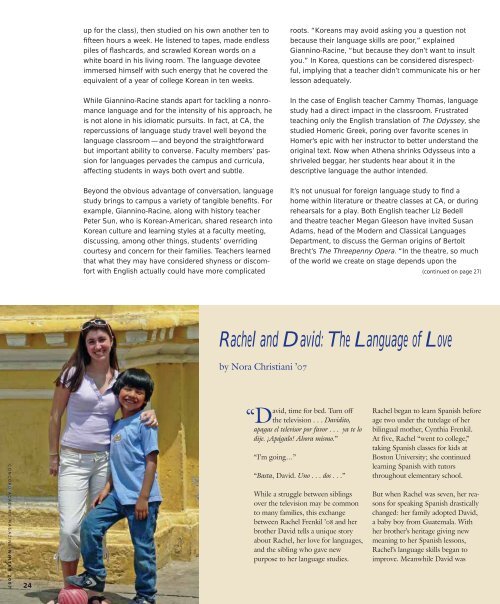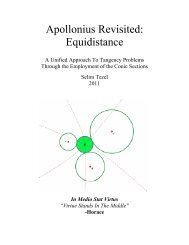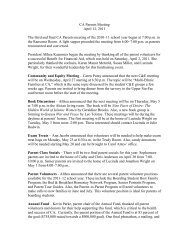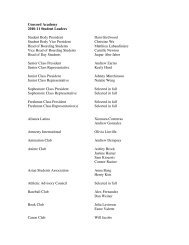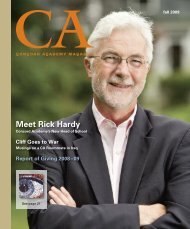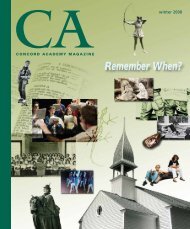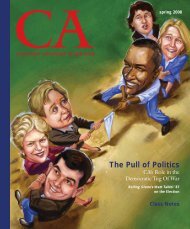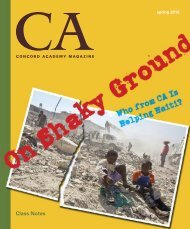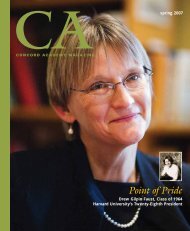winter 2007 - Concord Academy
winter 2007 - Concord Academy
winter 2007 - Concord Academy
- No tags were found...
Create successful ePaper yourself
Turn your PDF publications into a flip-book with our unique Google optimized e-Paper software.
up for the class), then studied on his own another ten tofifteen hours a week. He listened to tapes, made endlesspiles of flashcards, and scrawled Korean words on awhite board in his living room. The language devoteeimmersed himself with such energy that he covered theequivalent of a year of college Korean in ten weeks.While Giannino-Racine stands apart for tackling a nonromancelanguage and for the intensity of his approach, heis not alone in his idiomatic pursuits. In fact, at CA, therepercussions of language study travel well beyond thelanguage classroom — and beyond the straightforwardbut important ability to converse. Faculty members’ passionfor languages pervades the campus and curricula,affecting students in ways both overt and subtle.Beyond the obvious advantage of conversation, languagestudy brings to campus a variety of tangible benefits. Forexample, Giannino-Racine, along with history teacherPeter Sun, who is Korean-American, shared research intoKorean culture and learning styles at a faculty meeting,discussing, among other things, students’ overridingcourtesy and concern for their families. Teachers learnedthat what they may have considered shyness or discomfortwith English actually could have more complicatedroots. “Koreans may avoid asking you a question notbecause their language skills are poor,” explainedGiannino-Racine, “but because they don’t want to insultyou.” In Korea, questions can be considered disrespectful,implying that a teacher didn’t communicate his or herlesson adequately.In the case of English teacher Cammy Thomas, languagestudy had a direct impact in the classroom. Frustratedteaching only the English translation of The Odyssey, shestudied Homeric Greek, poring over favorite scenes inHomer’s epic with her instructor to better understand theoriginal text. Now when Athena shrinks Odysseus into ashriveled beggar, her students hear about it in thedescriptive language the author intended.It’s not unusual for foreign language study to find ahome within literature or theatre classes at CA, or duringrehearsals for a play. Both English teacher Liz Bedelland theatre teacher Megan Gleeson have invited SusanAdams, head of the Modern and Classical LanguagesDepartment, to discuss the German origins of BertoltBrecht’s The Threepenny Opera. “In the theatre, so muchof the world we create on stage depends upon the(continued on page 27)Rachel and David: The Language of Loveby Nora Christiani ’07CONCORD ACADEMY MAGAZINE WINTER <strong>2007</strong>24“David, time for bed. Turn offthe television . . . Davidito,apagas el televisor por favor . . . ya te lodije. ¡Apágalo! Ahora mismo.”“I’m going…”“Basta, David. Uno . . . dos . . .”While a struggle between siblingsover the television may be commonto many families, this exchangebetween Rachel Frenkil ’08 and herbrother David tells a unique storyabout Rachel, her love for languages,and the sibling who gave newpurpose to her language studies.Rachel began to learn Spanish beforeage two under the tutelage of herbilingual mother, Cynthia Frenkil.At five, Rachel “went to college,”taking Spanish classes for kids atBoston University; she continuedlearning Spanish with tutorsthroughout elementary school.But when Rachel was seven, her reasonsfor speaking Spanish drasticallychanged: her family adopted David,a baby boy from Guatemala. Withher brother’s heritage giving newmeaning to her Spanish lessons,Rachel’s language skills began toimprove. Meanwhile David was


